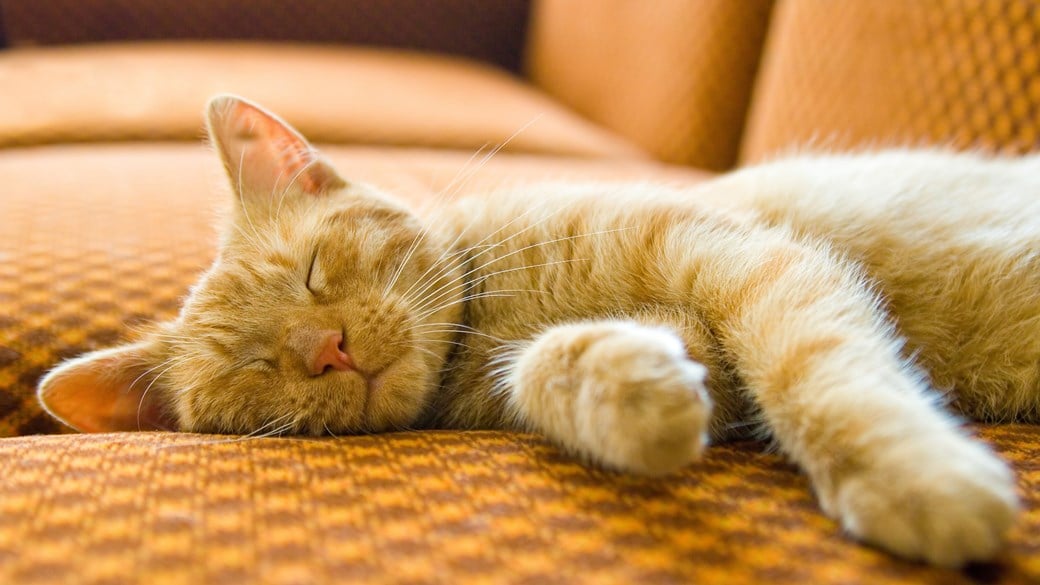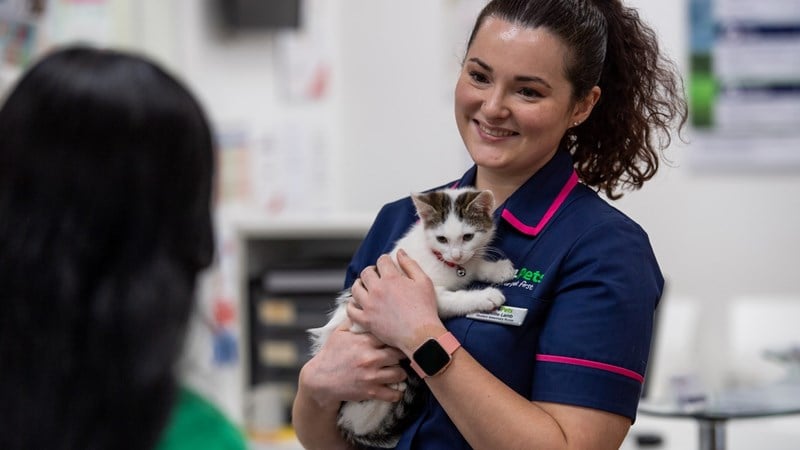
A guide to kitten sleeping habits
Understand more about the cat naps of your kitten with our sleeping habits guide; from their nocturnal behaviours to favourite snoozing spots.
You’ve probably already noticed that cats sleep a lot! They take naps throughout the day and night – this is called polyphasic sleep – and are often to be found curled up fast asleep during the day.
Cats are a crepuscular species, meaning they’re most active at dusk and dawn. These sleeping habits are programmed into cats who, even if they’re well-fed pets, were still designed to hunt for their food.
Hunting requires a lot of effort and cats need to be fully rested to have the best chance of catching their next meal. As your kitten grows, you’ll see their sleeping habits gradually settle into this pattern but when your new kitten joins your family, how much should you expect them to sleep, where should they sleep and how can you help to set up a good sleep routine for kittens?
How long do kittens sleep for?
Young kittens do sleep a lot! From birth until about two weeks of age, kittens need to sleep for around 22 hours per day, only really waking to feed. Once their eyes have opened, kittens begin to explore their environment more and sleep less. By the time they’re three months old, they’ll only need to sleep for about 18 hours, spread throughout the day and night. This isn’t far from the sleep requirements of adult cats, who average at around 16 hours per day.
When your kitten is asleep, it might be tempting to wake them up for a play or cuddle, or to meet a visitor. Lots of vital developmental and growth functions take place during sleep and interrupted or lack of sleep can be harmful to kittens. So, if your kitten is snoozing, always let them do so for as long as they need.
If your kitten is lively when they are awake and they’re eating, drinking and going to the toilet regularly, they are probably fine. But if you’re worried that your new kitten is sleeping all day and when they wake up, they still seem tired or lack energy and playfulness, reach out to your vet team so that they can check everything is as it should be.
Kitten sleeping habit FAQs
When your new kitten arrives, it could be the first time they’ve ever been separated from their mum or littermates, so they may feel anxious or stressed. It will help them to feel secure if you prepare their environment before they come home.
Your kitten will sleep best if they have a cosy, snug bed or blanket, placed somewhere they can sleep undisturbed while life goes on around them. Although adult cats like to climb and sleep on high perches, such as on top of furniture, it’s safest for young kittens if their beds are low down to begin with. Making a ‘kitten home’ inside a large puppy crate can work very well for those early days or weeks, particularly if there are other pets in the home, or children who may not remember to keep windows and doors closed. As well as a comfortable bed, a small cardboard box or cat igloo will give your kitten somewhere to hide. You can place a litter tray, food and water bowls and some kitten-safe toys inside the crate too. When you’re able to supervise your kitten, you can leave the door open so that they can come out to explore when they’re feeling confident. At night or when you can’t keep an eye on your kitten, you can close the crate door so that your kitten is safe.
If you don’t have access to a crate, or you don’t want to use one, place all your kitten’s resources in one room, where you can close the door at times you aren’t able to supervise. Kittens are curious little things and can hide or get stuck in small spaces around the home, so it’s best while they’re small, to confine them to one room. Before your kitten arrives, have a look all around the room at kitten’s eye level, to see whether you can spot potential places for them to get trapped, or get into mischief.
It might be possible for you to leave a small blanket or towel with your kitten’s previous owner so that you can bring it back with your kitten when you collect them. Having a familiar scent on their blanket can help your kitten to feel more secure when they come to live with you.
Cats might seem to be nocturnal, but they’re actually crepuscular, which means that they’re most active at dusk and dawn. They’ll sleep for some of the night and they’ll certainly take naps throughout the day. This allows them to hunt for small prey when the prey species are also most active. The polyphasic sleep pattern all cats display, which means sleeping in short bursts, rather than all day or night, allows them to recharge and be ready to go out and hunt again.
It's important that all young animals get enough sleep. It’s been shown that sleep deprivation is harmful to them, so what’s more important than trying to influence your kitten’s sleeping habits, is allowing them to sleep as much as they need to and never waking them when they’re fast asleep. Providing them with a safe place to sleep undisturbed will allow them to take plenty of time out and to rest properly.
Although adult cats have evolved to be able to live a solitary lifestyle, kittens and some adult cats may feel safer if they can sleep close to another pet or a human. Young kittens may never have slept alone before joining your family, so they may want to snuggle up with you for warmth and comfort.
If you’d like your kitten to be able to sleep close to you, you could do this by temporarily sleeping on a floor-level bed. If you bring your kitten up onto your usual bed, there’s the chance you might accidentally squash them or they may fall off the bed. It won’t be long before they’re able to climb on and off a bed by themselves, and then they can choose where they sleep.
To help your kitten to feel more secure and snug if they’re sleeping in their own bed, you could get them a microwaveable heat pad (these must always be used with appropriate covers to prevent burns) or a teddy to snuggle up against.
Cats and kittens are adapted to hunt for prey who are active during the night and twilight. In fact, cats are most active at dusk and dawn and they’ll nap throughout the day and night, so that they’re always ready for hunting.
If your kitten is lively and meowing at night and during the evening and early morning, that can be perfectly normal! As long as they have plenty of kitten-safe toys to hunt and play with, it’s fine to let them carry on. You may want to keep them confined to one room or to a large puppy crate during the night though, so that everyone else is able to get a good night’s sleep. If your kitten seems to meow a lot and you’re concerned that they aren’t just playing and they’ve got sufficient food, water and a clean litter tray available, then speak to your vet team who will be happy to check that everything is okay.
Remember that your kitten will need to get plenty of sleep during the day to make up for being active at night. Ensure they have a safe, cosy bed where they can curl up to recharge and never disturb them while they’re sleeping. Many important processes take place during sleep and a kitten’s healthy development relies on getting enough of it.
Health Plans to keep your cat healthy
At Vets4Pets we offer a range of Health Plans that make essential routine treatments more affordable. You'll save money on things like annual vaccinations, flea and worm treatment and routine health check-ups.

Cat Advice
Read more of our expert cat advice to keep your cat happy and healthy.
